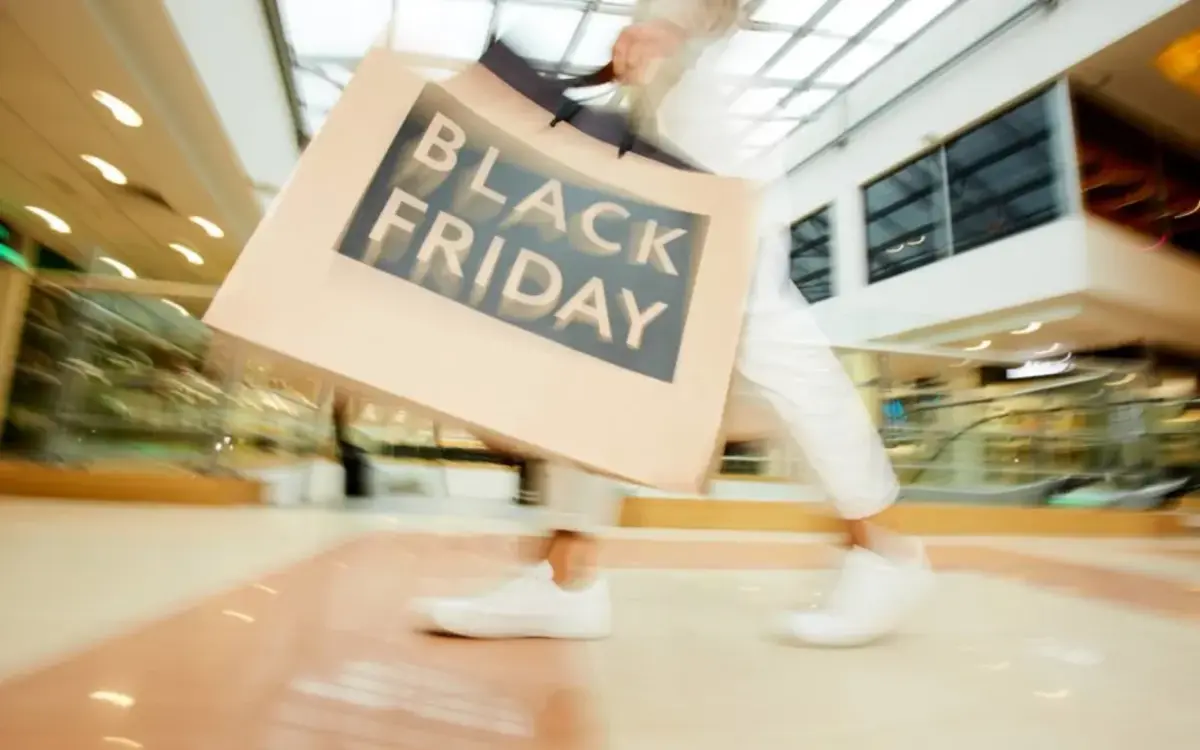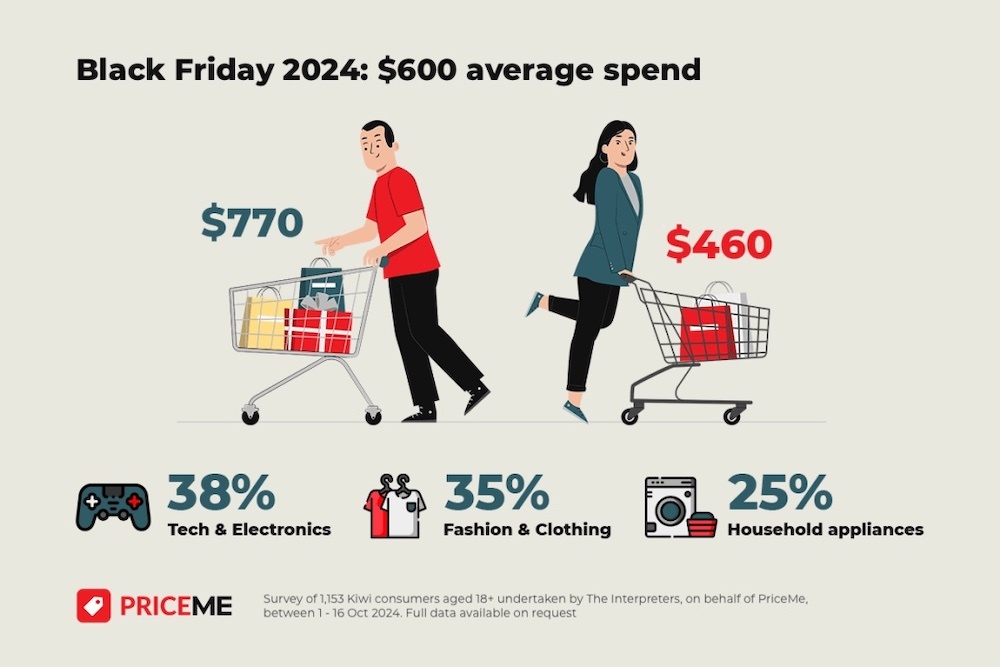What you need to know to get the best out of Black Friday
RNZ
21 November 2024, 10:44 PM

With more Kiwis keen to shop for a Black Friday bargain this year, people will be keeping their eyes peeled for the best deals.
Even though New Zealanders traditionally have not celebrated Thanksgiving - the precursor to Black Friday sales that follow the holiday on the fourth Thursday of November - the concept of the sales have swept the globe.
The cultural phenomenon, which has generally become known as a four-day sales period, revolves not just around the discounts, but the anticipation of frenzied shoppers pushing, shoving, and sometimes even fighting each other to get a bargain.
How has this become such a global phenomenon?
And are the sales all they're cracked up to be?
Why has it become such a big deal?
Black Friday is a time when people often nab Christmas presents - but it's our culture and what we have put a value on as a society that has infused us with this inherent sense of obligation to give gifts, University of Canterbury professor of marketing Ekant Veer says.

University of Canterbury professor of marketing Ekant Veer. Photo: University of Canterbury
"We get caught up in this frenzy of buying more to show love and marketers prey on that saying, 'hey, you're a good parent because you gave your kid that thing that made them really happy', and 'you're a good kid because your parents clearly got you something'."
According to a survey by PriceMe of more than 1100 people, 51 percent of Kiwis are planning to shop on Black Friday this year, compared with 35 percent in 2023.
Additionally, sales often have become elongated - including Boxing Day - because there's been a "democratisation of knowledge", where consumers often hold out on buying because they're more aware of when the sales are and how much they could save, Prof Veer says.

Retail NZ chief executive Carolyn Young Photo: Supplied
Retail NZ chief executive Carolyn Young says some businesses also stretch out sales to increase foot traffic ahead of the Christmas sales period, which is "critical in terms of the sustainability of retailers".
"It doesn't necessarily mean that you get greater turnover between when the sales starts and the Christmas period, but it just means that you're generating interest earlier."
Some smaller retailers can't afford to go that far and will stick to traditional sale seasons, Young says, while others feel the need to jump on the bandwagon to not miss out on the opportunity.
What could be worth buying during Black Friday sales?
PriceMe's survey data in October found the most interest from would-be shoppers was in technology and electronics (38 percent) followed by fashion and clothing (35 percent) and household appliances (25 percent).
PriceSpy says tech products had the most substantial Black Friday discounts last year, with the largest average discounts in games and consoles (-28 percent), keyboards and mice (-24 percent), speakers (-24 percent), televisions (-22 percent), and kitchen appliances (-20 percent).
"For 2024, we expect similar trends, with electronics leading the way. Non-tech categories like kitchen appliances, airfryers, espresso machines and vacuum cleaners also consistently perform well, with average discounts of around -20 percent."
PriceSpy recommends looking for older models in electronics.
"Retailers frequently discount previous-generation products, especially in categories like smartphones, headphones, and televisions, offering great value without sacrificing quality."
The beauty and health category offered an average discount of -21 percent on products during last Black Friday, according to PriceSpy data.
Some research based on average weighted prices conducted by PriceSpy in 2022 showed November was the best time to buy toasters, headphones, juicers and home security cameras. But it was the worst time to buy LEGO.
In general, it found the cheapest month in 2022 was November, with prices costing 7 percent less ($57) compared to the average price across the rest of the year.

Black Friday 2024 survey by PriceMe shows the average Kiwi plans to spend just over $600 this Black Friday, with the most popular purchases set to be: technology and electronics (38%), fashion and clothing (35%), and household appliances (25%). Photo: Supplied
What fish hooks to look out for when you're shopping in the Black Friday sales?
There's been a "recurring trend" of fake deals where some retailers raise their price ahead of Black Friday to deceive consumers into thinking their discount is bigger than it actually is, PriceSpy says.
"Last year, one in 10 offers (10 percent) fell into this category. While this isn't illegal, shoppers should be aware of this and extra cautious if a discount appears unusually large."
Don't fall for the pressure tactics like "one left, get in quick" or "don't miss out!", ConsumerNZ says.
"They're intentionally designed to create a sense of urgency, overwhelm or confusion. Don't fall for it - there's mostly likely enough in stock, and you probably won't "miss out."
Also watch out for an increase in delivery charges to offset large discounts, PriceSpy says. "It's wise to consider the full purchase cost, not just the discount percentage."
Financial adviser Tracy Hemingway of Debtfreediva NZ says it's wise to be wary of multi-buy deals.
"Like I know that it's one for $20 or two for $30, but have you just spent an extra $10 on something that you don't need? Rather than just spend the $20 on the one item that you did need."
So how do we avoid getting sucked into the frenzy?
Prof Veer has these tips:
- Be mindful and consider what you need versus what you want before you head out.
- Do your research. Use price checker and comparison websites to see who has the best deal and how it compares to the rest of the year.
- "They will put things on sale that people don't typically want as a way of luring people into the shop to get into the frenzy of 'while I'm here, I will also buy this thing at full retail price'."
- Set your budget and stick to it. Buying a few things that you don't need because they're at a good price will still mean they add up at the cashier.
But how does it compare to the other sales? And is it worth it?
Last year, PriceSpy's Price Index, a tool which monitors daily indexed price changes across the most popular products on the comparison website, was -7 percent on Black Friday, a slight improvement over 2022.
The average discount among discounted products was 21 percent.
But they also found 15 percent of products were actually more expensive on Black Friday compared to a standard shopping day, like 1 November 2023.
PriceMe also found many would be taking on extra debt to pay for their Black Friday purchases this year - it's something that's contributing to the idea of "gift poverty" where we overextend ourselves and go in debt just to buy something for others, Prof Veer says.
Buy NZ Made executive director Dane Ambler also says the hype around Black Friday "can fuel a culture of overconsumption, leading to unnecessary waste and strain on natural resources".
The phenomenon goes against what we're also being told about avoiding "accelerated consumerism", where we buy and consume more, more frequently, Prof Veer says.




